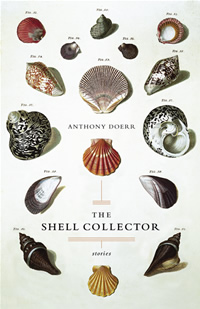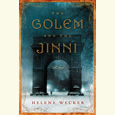Ribbons of Light
Anthony Doerr’s acclaimed Memory Wall is a graceful meditation on the power of the past
”Nothing lasts,” says Harold, a retiree and amateur paleontologist, to his wife Alma in the title story of Anthony Doerr’s Memory Wall. “For a fossil to happen is a miracle. One in fifty million. For the rest of us? We disappear into grass, into beetles, into worms. Into ribbons of light.” What, then, remains of the lives we have lived? How can experience and emotion be preserved for the millions of anonymous, outwardly unremarkable souls who nevertheless strive to live meaningfully? Are we doomed to be erased? Will we be remembered? What makes memory, and where does it reside? These are the central questions that loom over Anthony Doerr’s Memory Wall, a haunting and entrancing collection of tales from an acclaimed author whose wisdom and sensitivity vibrate in every paragraph of his carefully crafted, elegant prose.
 Doerr’s theme is not subtle. The collection opens with an epigraph—from Luis Buñuel’s My Last Sigh—on the urgent importance of memory: “Life without memory is no life at all.” The fantastic conceit of the superb title story is both literally and figuratively a science-fiction device: a machine which, when attached to the brain via Matrix-like rubber-capped nodes surgically installed in the skull, can extract and record human memories for repeat viewing on little miniature Betamax-style cassettes. Doerr wields this fantastic premise deftly. Though the machine is central to the story’s suspenseful plot, it functions primarily as a conduit into a remarkable study of the emotions stirred by the fusion of love and imminent mortality.
Doerr’s theme is not subtle. The collection opens with an epigraph—from Luis Buñuel’s My Last Sigh—on the urgent importance of memory: “Life without memory is no life at all.” The fantastic conceit of the superb title story is both literally and figuratively a science-fiction device: a machine which, when attached to the brain via Matrix-like rubber-capped nodes surgically installed in the skull, can extract and record human memories for repeat viewing on little miniature Betamax-style cassettes. Doerr wields this fantastic premise deftly. Though the machine is central to the story’s suspenseful plot, it functions primarily as a conduit into a remarkable study of the emotions stirred by the fusion of love and imminent mortality.
The story’s central character is Alma, the wealthy, elderly widow of Harold the paleontologist, whose philosophical musings on the nature of time and the significance of his beloved fossils come back to her again and again as she sinks into an armchair to listen to her own recorded memories. Alma is in the advancing throes of dementia; as her mind slips away from her, the memory machine is her sole connection to the past. “Water in a vase, chewing away at the stems of roses,” Doerr writes, describing Alma’s mental deterioration. “Rust colonizing the tumblers in a lock. Sugar eating at the dentin of teeth, a river eroding its banks. Alma could think of a thousand metaphors, and all of them were inadequate.”
 Curiously, Doerr imagines Alma as a resident of Cape Town, South Africa, in a region rich with prehistoric fossils and complicated by the social and racial politics of a post-Apartheid culture. Alma attempts to keep her memories organized by tacking them to a wall in her home, where they can be accessed by anyone whose brain is equipped with the proper rubber-capped plug holes. Hence, Alma’s past is opened up to Luzo, a young black boy being exploited by a nefarious “tall man” whose aim is to mine the memories of the elderly for information about how to access their valuables. Luzo, however, has his own intentions, and, without ever speaking to her, forms an intimate relationship with Alma, her late husband Frank, and her houseboy, Pheko, who continues to serve her partially out of loyalty to Frank and partially out of a desperate need for the meager salary. The orphaned Luzo thus becomes a conduit for the remembered lives of strangers, prompting luminescent reflections on the nature of memory and experience that linger long after the story’s stirring conclusion.
Curiously, Doerr imagines Alma as a resident of Cape Town, South Africa, in a region rich with prehistoric fossils and complicated by the social and racial politics of a post-Apartheid culture. Alma attempts to keep her memories organized by tacking them to a wall in her home, where they can be accessed by anyone whose brain is equipped with the proper rubber-capped plug holes. Hence, Alma’s past is opened up to Luzo, a young black boy being exploited by a nefarious “tall man” whose aim is to mine the memories of the elderly for information about how to access their valuables. Luzo, however, has his own intentions, and, without ever speaking to her, forms an intimate relationship with Alma, her late husband Frank, and her houseboy, Pheko, who continues to serve her partially out of loyalty to Frank and partially out of a desperate need for the meager salary. The orphaned Luzo thus becomes a conduit for the remembered lives of strangers, prompting luminescent reflections on the nature of memory and experience that linger long after the story’s stirring conclusion.
Doerr prefers the long story—several here, including “Memory Wall” and the spellbinding “Afterworld,” are almost long enough to be classified as novellas—but the collection also includes shorter pieces, giving Memory Wall an effect reminiscent of a symphony constructed out of seven movements instead of four. Two of the shorter pieces specifically examine the concepts of parenthood and childhood. In “Procreate, Generate,” Doerr brilliantly captures the longings and anxieties of an infertile Idaho couple yearning for the fulfillment of parenthood. “There is the cliché when Imogene tells Herb (Saturday night, Sunday night) that she’s fine, that she doesn’t need to talk about it,” Doerr writes. “When Herb overhears a student in the hall call him a ‘pretty ballsy professor’; when Imogene passes by two receptionists at lunch and hears one say, ‘I can’t even walk past Jeff without getting pregnant.’ Stretchmarks, baby formula, stroller brands; if you’re listening for something, it’s all you’ll hear. ‘Tell me anything, Imogene,’ Herb says. ‘But please don’t tell me you’re fine.’”
 In “The River Nemunas,” an adolescent girl with a dog named Mishap loses her parents and is shipped off abruptly to her nearest living relative, her Lithuanian grandfather, and Doerr’s ear is equally fine-tuned to the speech and sensibility of a frightened young girl trying to be brave in the face of extraordinary loss and upheaval. “Don’t tell me how to grieve,” says the orphaned Allison. “Don’t tell me ghosts fade away eventually, like they do in movies, waving goodbye with see-through hands. Lots of things fade away but ghosts like these don’t; heartbreak like this doesn’t. The axe blade is still as sharp and real inside me.” In each case, memory is always at stake: the memory of a lost mother and father; the imagined memory of a child that never was and a child that is perhaps yet to be.
In “The River Nemunas,” an adolescent girl with a dog named Mishap loses her parents and is shipped off abruptly to her nearest living relative, her Lithuanian grandfather, and Doerr’s ear is equally fine-tuned to the speech and sensibility of a frightened young girl trying to be brave in the face of extraordinary loss and upheaval. “Don’t tell me how to grieve,” says the orphaned Allison. “Don’t tell me ghosts fade away eventually, like they do in movies, waving goodbye with see-through hands. Lots of things fade away but ghosts like these don’t; heartbreak like this doesn’t. The axe blade is still as sharp and real inside me.” In each case, memory is always at stake: the memory of a lost mother and father; the imagined memory of a child that never was and a child that is perhaps yet to be.
Among Doerr’s many gifts as a storyteller is his ability to limn the universality of human experience through characters drawn from diverse stages of life in a variety of vividly rendered locales: an elderly Holocaust survivor transplanted to Ohio; that orphaned American teenager sent to live with her grandfather in Lithuania; the estranged parents of a young soldier facing a court martial in South Korea; the citizens of a Chinese village about to be buried underwater by a recently constructed dam. Doerr lives in Boise, Idaho, and his prose style resembles that of his home state’s most famous literary icon. Though his settings are widely diverse, we sense the same cold, sublime, unforgiving mountains in his stoic, understated, rhythmic sentences. Where Hemingway labored to leave his themes in the subtext, Doerr seizes moments of dialogue and narration to express philosophical aphorisms and insights that, while sometimes a bit heavy handed, are always astute and provocative. “Science,” one character muses, “is always concerned with context. But what about beauty? What about love? What about feeling a deep humility at our place in time? Where’s the room for that?” Anthony Doerr fearlessly challenges his readers to answer these and other ontological questions, reinforcing the power of fiction as a vehicle for self-knowledge and meditation. His spellbinding stories are rich in both the simplest pleasures of reading and the gift of truths already held but only just discovered.
On November 17 at 7 p.m., Anthony Doerr will read from his work in Buttrick Hall on the Vanderbilt University campus in Nashville. The event is free and open to the public.


